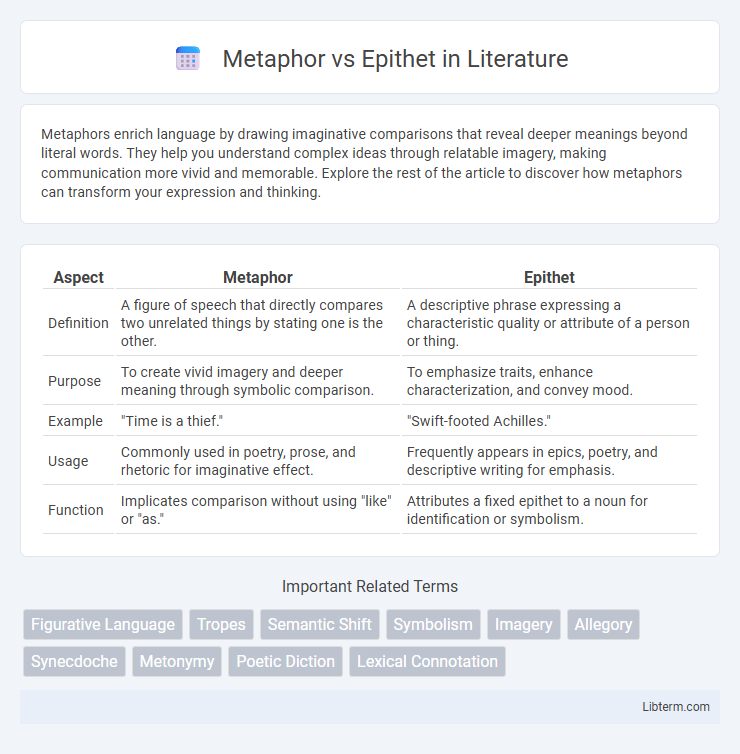Metaphors enrich language by drawing imaginative comparisons that reveal deeper meanings beyond literal words. They help you understand complex ideas through relatable imagery, making communication more vivid and memorable. Explore the rest of the article to discover how metaphors can transform your expression and thinking.
Table of Comparison
| Aspect | Metaphor | Epithet |
|---|---|---|
| Definition | A figure of speech that directly compares two unrelated things by stating one is the other. | A descriptive phrase expressing a characteristic quality or attribute of a person or thing. |
| Purpose | To create vivid imagery and deeper meaning through symbolic comparison. | To emphasize traits, enhance characterization, and convey mood. |
| Example | "Time is a thief." | "Swift-footed Achilles." |
| Usage | Commonly used in poetry, prose, and rhetoric for imaginative effect. | Frequently appears in epics, poetry, and descriptive writing for emphasis. |
| Function | Implicates comparison without using "like" or "as." | Attributes a fixed epithet to a noun for identification or symbolism. |
Introduction to Metaphor and Epithet
Metaphor is a figure of speech that directly compares two unrelated things by stating one thing is another, enhancing meaning through implied similarities. Epithet is a descriptive term or phrase expressing a characteristic quality or attribute of a person or thing, often used to highlight specific traits. Both devices enrich language, with metaphors creating symbolic connections and epithets emphasizing defining features.
Defining Metaphor: Meaning and Usage
A metaphor is a figure of speech that directly compares two unrelated subjects by stating one is the other, enhancing imagery and understanding through symbolic meaning. It conveys deeper significance by linking an abstract concept to a concrete image, often enriching literary and everyday language. Metaphors are extensively used in poetry, rhetoric, and communication to evoke emotions and clarify complex ideas without using "like" or "as.
Understanding Epithet: Definition and Purpose
An epithet is a descriptive term or phrase expressing a characteristic quality or attribute of a person or thing, often used to highlight a dominant feature or evoke imagery. Unlike metaphors, which imply comparisons, epithets serve as direct qualifiers that enhance the identity or essence of their subjects, such as "Alexander the Great" or "rosy-fingered Dawn." Their purpose is to provide clarity, emphasize enduring traits, and enrich narrative detail within literature and everyday language.
Key Differences Between Metaphor and Epithet
Metaphor is a figure of speech that directly compares two unrelated things to highlight a shared quality, such as saying "time is a thief" to imply time steals moments from life. Epithet, on the other hand, is a descriptive term or phrase expressing a characteristic quality or attribute of a person or thing, like "Alexander the Great," which emphasizes greatness. The key difference lies in metaphors creating symbolic connections through comparison, while epithets serve as fixed, intrinsic descriptors enhancing identification.
Historical Origins of Metaphor and Epithet
Metaphors originate from ancient Greek rhetoric, where they were used as a fundamental device to convey complex ideas through figurative language, enhancing poetic and oratory expression. Epithets, rooted in classical literature and mythology, served as descriptive labels or adjectives that emphasized notable traits or qualities of characters, gods, or places, anchoring their identity in cultural narratives. Both metaphors and epithets evolved as tools to enrich storytelling and communication by linking abstract concepts to vivid imagery or defining characteristics.
Role of Metaphor in Literature
Metaphors play a crucial role in literature by enabling writers to convey complex ideas and emotions through symbolic language, creating vivid imagery that resonates with readers. Unlike epithets, which are descriptive phrases highlighting specific traits of a character or object, metaphors transform ordinary expressions into powerful comparisons, enriching the narrative and deepening thematic meaning. By fostering imaginative connections, metaphors enhance literary works' emotional impact and interpretative layers.
The Function of Epithets in Language
Epithets serve a distinct function in language by attributing specific qualities or characteristics to nouns, enhancing vividness and emotional impact. They often create a fixed association with a person, place, or thing, aiding memory and identification while enriching descriptive detail. Unlike metaphors, which imply comparison through symbolic meaning, epithets provide direct, consistent qualifiers that shape perception and meaning in communication.
Common Examples of Metaphors and Epithets
Metaphors such as "time is a thief" and "the world's a stage" illustrate how one thing is described as another to highlight shared characteristics. Common epithets include phrases like "rosy-fingered dawn" from Homer's works or "swift-footed Achilles," which attribute specific qualities to a person or object, enhancing its vividness. Both metaphors and epithets enrich language by invoking imagery and emotional resonance, often found in literature and everyday speech.
Impact on Reader Perception and Imagination
Metaphors create vivid mental images by linking unrelated concepts, enhancing reader imagination and fostering deeper emotional connections. Epithets, through concise character or object descriptors, sharpen perception and evoke specific traits that influence how readers interpret personalities or settings. Both devices shape reader engagement, with metaphors broadening imaginative horizons and epithets reinforcing focused understanding.
Choosing Between Metaphor and Epithet in Writing
Choosing between metaphor and epithet in writing depends on the desired effect and clarity. Metaphors create vivid, imaginative comparisons that evoke deeper meaning by linking two unlike concepts, enhancing emotional resonance. Epithets, on the other hand, use descriptive adjectives or phrases to highlight inherent qualities, providing concise characterization and reinforcing traits without the complexity of figurative comparison.
Metaphor Infographic

 libterm.com
libterm.com